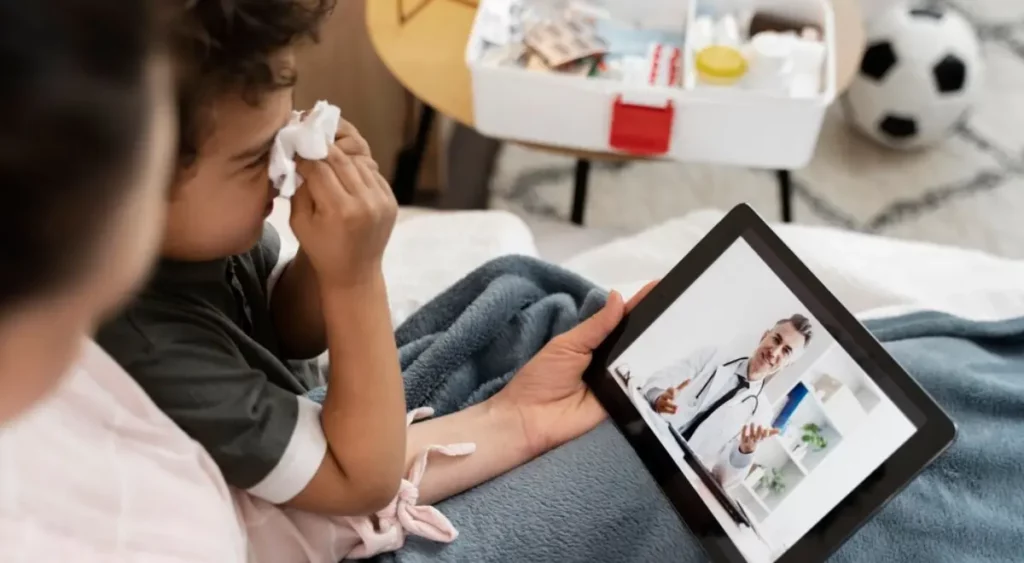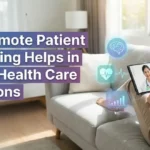Remote Patient Monitoring & Chronic Care Management for Obesity Management

Obesity remains a global health concern and has been identified as a chronic disease by the healthcare department. A recent survey reveals an alarming fact on obesity, claiming that over 42% of adults in the United States are classified as obese. With the ongoing trends, half of the US population will struggle with obesity by 20230.
Though some appetite suppression drugs are delivering promising outcomes, their long term use can result in potential health risks and the risk of medication dependence. An effective and safe approach to deal with obesity management includes building new habits. This along managing healthy weight and body mass index (BMI) can ultimately ward off obesity-related health risks.
Table of Contents
ToggleImportance of Remote Monitoring in Obesity Management
Remote care is an effective remedy in the fight against obesity, while also lowering healthcare expenditures. Healthcare providers can deliver effective outcomes by integrating virtual care management strategies such as Chronic Care Management (CCM) and Remote Patient Monitoring (RPM).
- Vital Stats Monitoring: Regularly monitor weight, blood pressure, and other vital health metrics to assess progress and change treatment programs as needed.
- Behavioral Monitoring: Conduct periodic symptom surveys to monitor and manage behaviors such as addictive eating.
- Activity Tracking: Use wearable technologies to monitor physical activity and encourage a more active lifestyle.
- Nutrition Coaching and Education: Get personalized dietary advice and nutritional education based on individual needs.
A Medication-Free Approach to Weight Management
To ward-off obesity and to maintain a healthy weight, non-medication based weight management alternatives are becoming increasingly popular. Digital weight management apps and cellular based medical devices that help track weight and other health measurements have seen a tremendous rise in demand to help users meet their weight loss goals.
Remote patient monitoring companies are at the forefront of this transition and utilizing the latest technology to monitor weight using smart scales. These developments can be effectively used with medication-based techniques to strategize appropriate weight loss treatment plan and track patient adherence.
Both Remote Patient Monitoring (RPM) and Chronic Care Management (CCM) play a critical role in improving outcomes
How RPM Helps With Obesity Management?
Remote Patient Monitoring (RPM) is a technology-driven healthcare delivery model that uses both cellular and Bluetooth devices to collect medical and health-related data from individuals in one location and electronically transmit it to healthcare providers in another location for continuous monitoring and assessment.
- Continuous Monitoring Of Vital Signs
RPM enables continuous monitoring of critical health indicators such as weight, blood pressure, heart rate, and blood glucose levels. Continuous monitoring of these indicators is crucial for obese individuals to assess progress, change treatment plans, and spot potential health issues.
- Personalized Treatment Plans
One of RPM’s benefits is its ability to enable personalized care plans based on individual patient needs. Healthcare providers can create personalized nutrition and exercise regimens by recording and analyzing patient data, resulting in a more targeted and successful approach to weight management.
- Enhanced Patient Engagement
RPM promotes patient participation and empowerment. Near real-time monitoring and feedback mechanisms allow patients to actively participate in their care, resulting in enhanced treatment adherence and health outcomes.
How CCM Helps With Obesity Management?
Chronic Care Management (CCM) is a comprehensive care delivery model that takes a systematic approach to meeting the healthcare needs of people with multiple chronic illnesses. Its goal is to enhance patient outcomes by better care coordination, frequent follow-ups, and patient education.
- Comprehensive Care Coordination
CCM provides an organized framework for effectively managing obesity. CCM ensures a cohesive and integrated approach to obesity treatment by coordinating efforts among primary care clinicians, specialists, and other healthcare experts, addressing both medical and behavioral components.
- Regular Follow-ups & Monitoring
Daily monitoring is essential to CCM. By keeping track of patient’s vitals, CCM allows clinical staff to closely monitor patients’ progress, provide timely interventions, and make appropriate changes to the care plan.
- Patient Education & Support
CCM sees patient education and support as critical components of obesity management. Through educational materials, counseling, and lifestyle coaching, CCM provides patients with the knowledge and skills they need to make healthier choices, control their weight efficiently, and avoid issues.
Nutritional Education & Dietary Guidance For Obesity Management
RPM & CCM collaboratively emphasize the importance of patient education as a key component of chronic obesity management. CCM enables healthcare providers to deliver comprehensive nutritional education, including information on healthy eating habits, portion control, and meal planning. This provides patients with the knowledge they need to make informed and healthier eating choices, thereby improving long-term weight loss and reducing obesity consequences.
Both RPM and CCM advocate for lifestyle coaching and behavioral change treatments as critical components of obesity management. RPM and CCM promote long-term behavioral change by addressing the underlying behavioral variables that contribute to obesity, resulting in sustained weight loss and better overall health.
Aside from their usual role in monitoring crucial health metrics, RPM and CCM play an important and revolutionary role in behavioral monitoring, which is a critical component of obesity management.
Conclusion
RPM and CCM support the provision of behavioral coaching and education as essential components of obesity management and extend their roles beyond health metric monitoring to encompass comprehensive activity tracking as part of obesity management.
Utilizing the data gathered through the RPM platform, healthcare providers can develop and execute personalized physical activity recommendations personalized to individual patient needs, preferences, and capabilities. Via CCM, healthcare providers can offer comprehensive activity education, strategies to overcome barriers to physical activity, and motivational support to encourage patients to increase their activity levels and maintain an active lifestyle.
HealthArc’s all-in-one Remote Patient Monitoring and Chronic Care Management platform helps practices connect to their obese patients, and provide recommendations and medication adherence guidelines for increased clinical efficiency.
Schedule a free demo today to find out how our digital health platform works or call us today at +201 885 5571 to know how we can help you get the best results for your clinical practice.
Frequently Asked Questions (FAQs)
RPM enables providers to continuously monitor key health indicators such as weight, BMI, blood pressure, and blood glucose. This real-time tracking allows care teams to identify early risks, adjust treatment plans, and motivate patients to sustain healthier habits.
CCM focuses on long-term coordination and follow-up for patients managing chronic conditions associated with obesity—including diabetes, hypertension, and cardiovascular diseases. It ensures consistent engagement, medication adherence, and preventive lifestyle guidance.
HealthArc’s digital care management platform integrates both RPM and CCM programs, allowing providers to remotely track patient vitals, share health data, and deliver personalized guidance through one unified system. It connects with major EHRs using HL7/FHIR for seamless care coordination.
Connected devices such as smart weight scales, blood pressure monitors, glucometers, pulse oximeters, and activity trackers are used to capture continuous health data, supporting data-driven decision-making and behavioral accountability.
These programs combine continuous data monitoring with consistent coaching, resulting in higher treatment adherence, better control of comorbidities (like diabetes and hypertension), and sustainable weight management outcomes.
Yes. CMS reimburses RPM (CPT codes 99453–99458) and CCM (CPT codes 99490, 99439) for eligible patients with chronic conditions related to obesity. This allows healthcare providers to deliver virtual preventive and ongoing care.
By minimizing unnecessary in-person visits, readmissions, and complications, RPM and CCM can reduce annual healthcare spending by 15–25% per patient, while enhancing patient satisfaction and long-term engagement.
Monitoring vital signs all the time helps doctors spot early signs of diabetes, high blood pressure, and heart disease. RPM makes it easier to manage these conditions by sending alerts in real time, allowing for timely interventions, and allowing for medication changes.
Yes. RPM programs give patients control over their weight loss journey by having them keep track of their daily activity, nutrition, and vital signs. The constant feedback loop keeps patients in touch with their care teams and makes them responsible.
Results vary, but research indicates that patients utilizing remote monitoring alongside lifestyle coaching can achieve a weight reduction of 5–10% over six months, contingent upon adherence and engagement levels.
Not completely—RPM and CCM don’t replace in-person care; they work together with it. They continuously monitor the situation in between visits and assist in determining when an in-person evaluation or intervention is necessary.
RPM platforms have digital logs and reminders that help people become more aware of their calorie intake, exercise, and sleep patterns. Clinicians can use these insights to make personalized lifestyle suggestions and help patients stick to healthy habits.
Currently, doctors primarily use RPM for adults, but they are increasingly exploring its application for teens, particularly to aid in early weight loss and monitor other health issues such as insulin resistance.
Some new technologies are AI-powered predictive analytics, virtual nutrition coaching, and wearable biosensors that can identify metabolic patterns in real time. Medicare’s growing coverage of digital health services that help prevent problems will speed up adoption even more.
Most Recent Blogs
Categories
Related Blog
- February 4, 2026 | Read Time: 16 mins
The Most Common Chronic Diseases and How to Manage Them Effectively
Chronic diseases are one of the biggest problems that healthcare systems around...
Learn More- December 22, 2025 | Read Time: 23 mins
CMS ACCESS is Advancing Chronic Care through Effective, and Scalable Solutions
Introduction: Why Chronic Care Needs a New Model Chronic disease management has...
Learn More- December 20, 2025 | Read Time: 10 mins
Coverage Gaps ACCESS Aims to Fill: What Traditional Medicare Payment Left Behind
Medicare paid for visits but not for care. For a long time,...
Learn More


